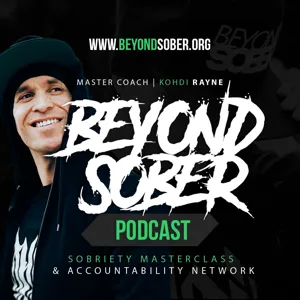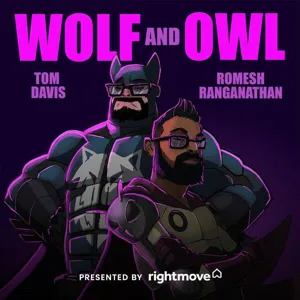Podcast Summary
The importance of being prepared and adaptable in the face of adversity: Despite no place being completely safe, being prepared, adaptable, and having community support can help navigate through adversity
No place, not even one called Paradise, is completely safe from the harsh realities of life, especially in the face of natural disasters and unpredictable circumstances. The story of Richard and Zeta Gore, who lost their dream home in the Paradise, California fire, serves as a reminder of the importance of being prepared and adaptable in the face of adversity. Additionally, the TED Radio Hour encourages us to dream big, challenge ourselves, and seek out new ideas, even when they may challenge our beliefs or make us feel uncomfortable. The power of human care and community support, as represented by Humana's group insurance plans, can help individuals and families navigate through difficult times.
Making Homes and Communities Fire-Resilient: Individuals can clear brush and install metal screens, communities can work together on fire-adapted landscapes, and innovative fire management techniques are necessary to prevent and manage megafires. Indigenous wisdom can guide these efforts.
Addressing the megafire crisis in California requires a multi-faceted approach. Individuals can take simple steps to make their homes more fire-resilient, such as clearing brush around their homes and installing metal screens in vents. Communities can work together to create fire-adapted landscapes through prescribed burns and reducing overgrown vegetation. Additionally, innovative fire management techniques are necessary to prevent and manage megafires. The wisdom of indigenous peoples, who have long understood the importance of fire in maintaining healthy landscapes, can guide these efforts. By implementing these solutions, we can reduce the risk of devastating fires and protect communities like Paradise and South Lake Tahoe.
Leveraging innovation and technology for effective wildfire management: Investing in advanced equipment and rapid response, updating building codes, and implementing early warning systems can help mitigate wildfire risks and build community resilience.
Innovation and technology play a crucial role in effectively managing and mitigating the risks of wildfires. The example of the Quick Reaction Force (QRF) in Southern California demonstrates the potential of rapid response with advanced equipment, such as helicopters capable of dropping large amounts of water on fires and refilling frequently. By bringing a significant amount of fire management resources to a fire quickly, fires can be contained before they become unmanageable. Rebuilding in fire-prone areas with updated building codes and early warning systems can also contribute to community resilience. The aftermath of the devastating fire in Paradise, California, showed that rebuilding and adapting to the new conditions can lead to a stronger sense of community and appreciation for the open spaces. Overall, it's essential to learn from past experiences, invest in technology, and work together to build a more resilient and sustainable future.
How Technology Changes Our Perception of Paradise: Through personal stories and exploration, we learned that paradise can be an illusion based on our desires and experiences, and the search for it might not bring harmony but instead highlight differences.
Our perception of paradise can be an illusion and often depends on our personal experiences and perspectives. Manush Jadhav, host of The Ted Radio Hour, explored this idea through a special series called Body Electric, which investigated how technology is changing our bodies and minds. He also shared a personal story from travel writer Pico Iyer, who reflected on his experiences of paradise and the realization that it can be a projection of our desires. Iyer further delved into this concept during the pandemic, questioning if paradise can be found in a world of conflict and uncertainty. He traveled to various places, including Iran, North Korea, and war-torn regions, to find hope and inspiration amidst difficulty. This philosophical journey led him to question the very search for paradise and whether it might not only aggravate our differences. Overall, the series and Iyer's reflections encourage us to consider the nature of paradise and how it shapes our lives.
A reminder of human capacity for faith and resilience in the heart of Iran: The search for paradise is not about notions or ideals, but about the richness and complexity of human experiences
In the heart of Iran, the land of competing visions of paradise, lies a profound reminder of the human capacity for deep faith and resilience. The ruling clerics hold a precise notion of paradise for the faithful, while many citizens hold more worldly desires. Yet, it's these differences that create a unique convergence of thoughts and experiences. I was moved by the young taxi driver I met, who embodied the complexities of paradise. He led me through the bustling crowds during a religious festival, where the intensity of faith was palpable. But as we left the shrine, he shared his personal story of risking his life to start a new life in England, only to return every summer to Iran. His deep devotion and longing for his homeland illustrated the complexities and contradictions of the human experience. This encounter served as a powerful reminder that the search for paradise is not about notions or ideals, but about the richness and complexity of human experiences.
Appreciating the paradise in the present: Our search for a perfect paradise can be an illusion. Embrace and appreciate the imperfect joys of the present.
Our sense of paradise or contentment often comes from a combination of different places and experiences in our lives. Pico Iyer's journey highlights how our longing for a better world or self can be an illusion, and that we should appreciate and not take for granted the paradise we have in our present. Varanasi, India, serves as an example of a place that challenges our simple ideas about the world and reminds us of the importance of joy and gratitude even in the face of death and imperfection. The holy city's intensity and contradictions, such as the filthy yet revered Ganges River, underscore the idea that the holiest place doesn't have to be the purest place, and that human beings' imperfections are part of the richness of life.
Finding paradise in the midst of life's struggles: We don't need to travel far to find paradise, it exists in the realities and struggles of life.
According to travel writer Pico Iyer, paradise is not something we can create in our minds or find in far-off places, but rather it exists in the midst of the realities and struggles of life. Iyer shared a memorable experience during a chaotic moment in Kolkata, India, where he was comforted by two Tibetan Buddhists who encouraged him to embrace the chaos as the only paradise we can ever hope to find. This idea was echoed by Zen teacher Edo Roshi, who famously said that "the struggle of your life is your paradise." Iyer interprets this as the notion that it's in the very struggles of life that we can find joy, wonder, and hope. The idea of finding paradise in the midst of life's sorrows and joys, whether unexpected or planned, is a reassuring and inspiring concept. It reminds us that we don't have to travel across the world to find it, but rather open our eyes to the reality of life as it is.
From Energy Crisis to Renewable Energy Paradise: University professor Ramon Mendez Galain transformed Uruguay into a renewable energy leader, addressing energy crisis, saving costs, ensuring energy sovereignty, and creating jobs
Crisis can lead to opportunity, as demonstrated by Uruguay's transformation into a renewable energy paradise. Fifteen years ago, Uruguay faced a deep energy crisis, but university physics professor Ramon Mendez Galain saw renewables as the best solution. He went from writing a proposal to becoming the country's national director of energy and spearheading the shift from fossil fuels to renewables. Renewables offered cost savings, energy sovereignty, and job creation, making it the best option for both the global climate and Uruguay's economy. Despite initial skepticism, Mendez Galain's determination paid off, and Uruguay now exports renewable energy to its neighbors and runs on 98% renewable energy.
Uruguay's Renewable Energy Transition: Innovative Planning, Policy, and Technology: Uruguay went from 0% to 98% renewable energy in 5 years by focusing on wind and solar, managing intermittency with software, and using water as backup. It creates jobs, reduces costs, and makes countries energy-independent. Other countries should learn and focus on sustainable consumption and transportation.
Uruguay's successful transition to renewable energy is a testament to innovative planning, public policy, and the use of advanced technology. With a focus on renewable sources like wind and solar, Uruguay went from having almost no renewable energy in 2012 to being 98% renewable by 2017. The country's unique approach includes managing intermittent sources with advanced software and using water as a backup energy source. Ramon Mendez-Geline, the executive director of Associate Seon IV, emphasizes that this solution creates jobs, reduces costs, and makes countries energy-independent. He encourages other countries to learn from Uruguay's experience and focus not only on renewable electricity but also on sustainable consumption and transportation. Mendez-Geline's message is that there is a practical and effective solution to the energy challenge, and it's working in Uruguay. The future lies in continuing to innovate and find ways to live more sustainably, not just in producing renewable energy but also in how we consume and transport ourselves.
The power of community in times of need: Even in the darkest moments, the wisdom and support of those around us can help us recover and thrive
Even in the darkest moments of adversity, the wisdom and support of those around us can help us recover and thrive. The speaker, who survived a traumatic car accident and woke up blind and unable to walk, was taken in by a senior home where the residents used their skills and experiences to help her learn essential life skills, from eating and crossing the street to speaking and writing. Despite her initial reluctance, the speaker was eventually able to regain her independence and return to college, thanks to the compassionate care and guidance of the senior citizens. This story highlights the importance of community and the power of wisdom, especially in times of need.
The Power of Collaboration and Community: Collaboration and community can lead to remarkable outcomes, as shown by Ramona Pearson's journey to regain her sight.
The power of collaboration and community can lead to remarkable outcomes, even in the face of significant challenges. Ramona Pearson, a tech entrepreneur, shared her personal story of regaining her sight after a decade-long absence and credited her progress to the collective efforts of people working together to rebuild and re-educate her. This concept of radical collaboration was present before her accident, but the term wasn't used. Pearson emphasized that she wouldn't be where she is today without the support of her collaborators. The lesson here is that when we work together, we can achieve great things, and this principle applies to all aspects of life. Additionally, the podcast team at NPR made a request for listeners to take a brief survey at NPR dot org slash Ted survey to help improve the show. The episode was produced by a team at NPR, with audio engineering by several individuals, and partnerships with TED and various sponsors. The theme music was written by Romtine Arablui, and the episode was sponsored by Mint Mobile and IXL Learning.





